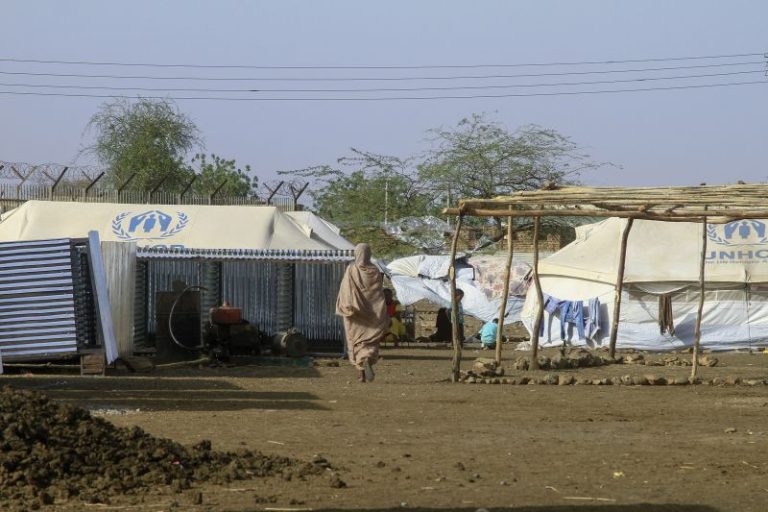One woman sleeps with a knife under her pillow, in the hope she can protect herself against armed men who might storm her house at night. Another was raped “repeatedly for days” along with her four daughters, while her husband and sons were forced to watch. Another was thrown out of her home and separated from her children after her husband discovered she had become pregnant by rape.
These are among the horrific accounts of sexual violence committed against women and girls in Sudan by the east African country’s warring parties – particularly the paramilitary Rapid Support Forces (RSF) – in the capital Khartoum since fighting began last year, as detailed in a major report from Human Rights Watch (HRW).
Since civil war broke out in April 2023 between the Sudanese Armed Forces (SAF) and RSF rebels, swaths of the city have been reduced to rubble, as the SAF has bombed civilian neighborhoods to try to dislodge the RSF from its entrenched positions. The conflict has spilled into other parts of the country too, including its western Darfur region.
The United Nations has described the situation in Sudan as “one of the worst humanitarian disasters in recent memory,” with more than 6 million Sudanese internally displaced, 1.5 million seeking safety abroad, and nearly 26 million people – more than half of the population – at risk of famine.
During 15 months of conflict, women and girls in the capital have been subjected to widespread acts of rape, including gang rape, as well as forced marriages and sexual slavery, according to HRW’s 88-page report, titled “Khartoum is Not Safe for Women” and released on July 29.
“The Rapid Support Forces have raped, gang raped, and forced into marriage countless women and girls in residential areas in Sudan’s capital,” said Laetitia Bader, deputy Africa director at HRW.
“The armed group has terrorized women and girls and both warring parties have blocked them from getting aid and support services, compounding the harm they face and leaving them to feel that nowhere is safe,” she added.
Due to the difficulty in accessing Khartoum and speaking to survivors directly, HRW instead interviewed 42 healthcare providers, social workers and other responders between September 2023 and February 2024. Of those, 18 had provided direct care to a total of 262 survivors of sexual violence, aged from 9 through 60.
One psychiatrist, who supported more than 40 rape victims between April and November last year, recalled a survivor who had been raped and then discovered she was three months pregnant.
“She was clearly traumatized and shivering – afraid of how her family would react. She said to me, ‘If they discover my situation, they will kill me,’” the psychiatrist said in the HRW report.
Another doctor recounted the ordeal of a woman who said she had been raped by several RSF fighters.
“When the woman found out she was pregnant, her husband expelled her and took away their children. She was left on the streets,” the doctor said.
The woman came to the clinic seeking an abortion but the hospital director did not agree to the procedure, the doctor recalled. Another hospital could not perform the termination because it did not have an obstetrician.
“After the pregnancy exceeded four months, we had to offer her psychological support so that she could accept the condition. It was the only option available to us,” the doctor added.
The report said that “the physical, emotional, social and psychosocial scars left on survivors are immense.” Healthcare workers recalled treating survivors with “debilitating injuries they sustained due to the violence of the rapes and gang rapes, including vaginal bleeding, bruises and other physical trauma.” In at least four cases, these injuries proved fatal.
War crime accusations
Although the report mostly detailed violence committed by RSF forces, it said that some survivors had been scared to report incidents involving SAF soldiers, because they feared the authorities would dismiss their claims.
It also criticized both sides for preventing a comprehensive response to gender-based violence. HRW said the SAF had willfully restricted humanitarian supplies and imposed a de facto blockade on drugs entering the RSF-controlled parts of Khartoum since late last year.
The RSF has also pillaged medical supplies, according to the report, and some fighters “have on occasion perpetrated acts of sexual violence” against healthcare providers. One healthcare provider recalled being told not to report instances of sexual violence to the UN.
“I can kill you right here right now if you want to, you should be careful and stop sending reports,” the fighter reportedly said.
The report’s authors said the documented cases of sexual violence, forced marriage and deliberate attacks on healthcare facilities and providers constitute “a serious violation of international humanitarian law,” as well as war crimes and crimes against humanity.
Despite the severity of the suffering, HRW said there had been “little meaningful regional or international response.” It called on both sides immediately to stop attacks on healthcare facilities and workers and to allow aid to enter conflict zones.
The report added that the UN Security Council should call on the warring parties to end sexual violence and impose targeted sanctions against the commanders and perpetrators responsible for the atrocities.

